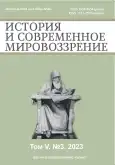Инвестиционная политика Британии в России в конце XIX — начале XX вв. в англо-американской историографии
- Авторы: Камынин В.Д.1, Боброва И.В.1
-
Учреждения:
- Уральский федеральный университет имени первого Президента России Б.Н. Ельцина (УрФУ)
- Выпуск: Том 5, № 3 (2023)
- Страницы: 161-166
- Раздел: ИСТОРИОГРАФИЯ
- URL: https://bakhtiniada.ru/2658-4654/article/view/257389
- DOI: https://doi.org/10.33693/2658-4654-2023-5-3-161-166
- ID: 257389
Цитировать
Аннотация
В статье показывается как менялся взгляд англоязычных ученых на причины притока британских инвестиций в российскую экономику в конце XIX — начале XX вв. Сделан вывод о том, что отношение к этому вопросу проделало существенную эволюцию. Если в первой половине XX в. ученые считали приток иностранного капитала следствием осознанных усилий центральной власти и особенно министров финансов И.А. Вышнеградского и С.Ю. Витте, то с 1960-х гг. в связи с ростом популярности теории модернизации на Западе понимание проблемы стало усложняться. Современные англоязычные ученые считают, что помимо мер, предпринятых российским правительством, существовал целый спектр других как внутренних, так и внешних факторов, повлиявших на динамику иностранных инвестиций. Ученые указывают, что модель британских инвестиций не соответствовала циклу экономического развития России. Приток британского капитала базировался на предыдущем опыте экспорта британской продукции на российский рынок. Британский капитал «вытеснялся» из Великобритании низкими внутренними доходами и «переманивался» за границу обещанием получения высокой прибыли в менее развитых странах. Британское правительство было заинтересовано в экономическом освоении новых богатых ресурсами регионов Кавказа, Урала, Сибири и Дальнего Востока. В рамках дискуссии, посвященной роли британского капитала в российской промышленности, выделяется спор экономистов, разразившийся в 1970-е гг. по поводу того влияния, которое оказало на приток иностранных инвестиций введение золотого стандарта российского рубля.
Полный текст
Открыть статью на сайте журналаОб авторах
Владимир Дмитриевич Камынин
Уральский федеральный университет имени первого Президента России Б.Н. Ельцина (УрФУ)
Email: vladimir.kamynin@urfu.ru
ORCID iD: 0000-0001-5564-4602
доктор исторических наук, профессор, профессор кафедры теории и истории международных отношений
Россия, ЕкатеринбургИрина Викторовна Боброва
Уральский федеральный университет имени первого Президента России Б.Н. Ельцина (УрФУ)
Автор, ответственный за переписку.
Email: ermolinskaya@mail.ru
ORCID iD: 0000-0002-0452-048X
SPIN-код: 7040-8784
старший преподаватель кафедры лингвистики и профессиональной коммуникации на иностранных языках
Россия, ЕкатеринбургСписок литературы
- Ананьич Б. В. Иностранное предпринимательство и промышленное развитие России в конце XIX — начале XX в. (о книге Джона Маккея) // Критика новейшей буржуазной историографии. Сборник статей / Труды Ленинградского отделения Института истории СССР АН СССР. Вып. 15 / ред. колл.: О. Л. Вайнштейн (отв. ред.), Р. Ш. Ганелин, Н. Е. Носов, В. И. Рутенбург, Г. Л. Соболев, А. А. Фурсенко. Л.: Наука, Ленингр. отд., 1976. С. 179–195.
- Боброва И. В. Политика привлечения иностранного предпринимательского капитала С. Ю. Витте в англо-американской историографии // Известия Саратовского университета. Новая серия. Серия: История. Международные отношения. 2023. Т. 23, вып. 2. С. 159–166.
- Большакова О. В. Парадигма модернизации в англо-американской русистике (Российская империя)//Политическая наука. 2003. С. 139–157.
- Грегори П. Экономический рост Российской империи (конец XIX — начало XX в.): Новые подсчёты и оценки / Пер. с англ. — М.: РОССПЭН, 2003. 256 с.
- Оль П. В. Иностранные капиталы в России. Пг.: Ин-т экон. исследований, 1922. 304 с.
- Barkai H. The Macroeconomics of Tsarist Russia in the Industrialization Era: Monetary Developments the Balance of Payments and the Gold Standard // Journal of Economic History. 1973. № 2, pp. 339–371.
- Black, C. E. ed., The Transformation of Russian Society: Aspects of Social Change Since 1861. Cambridge, Mass.: Harvard University Press, 1960. 695 p.
- Carstensen F. Foreign Participation in Russian Economic Life: Notes on British Enterprise, 1865–1914 // Guroff G., Carstensen F. (eds.) Entrepreneurship in Imperial Russia and the Soviet Union. Princeton: Princeton University Press, 1983. 158 p.
- Cottrell P. British Overseas Investment in the Nineteenth Century. London: Macmillan, 1975, 79 p.
- Drummond I. M. The Russian Gold Standard, 1897–1914 // Ian M. Drummond The Journal of Economic History , Sep., 1976, Vol. 36, No. 3 (Sep., 1976), pp. 663–688
- Falkus M. The Industrialization of Russia, 1700–1914. London: Macmillan, 1970, 96 p.
- Gatrell P. Modernisation Strategies and Outcomes in Pre-Revolutionary Russia // Modernisation in Russia. Finnish Literature Society. Helsinki. 2006. 332 p.
- Gregory P., Sailors J.W. Russian Monetary Policyand Industrialization. 1861–1913 / / This Journal. 1976. № 4, pp. 836–851.
- Gregory P. The Russian Balance of Payments, the Gold Standard, and Monetary Policy: A Historical Example of Foreign Capital Movements // Journal of Economic History. Vol. 39. № 2. June 1979, pp. 379–400.
- Hartley J. M. Siberia: A History of the People. Yale University Press. New Heaven, London. 2014, 323 p.
- Jones T. British Business in Russia, 1892–1914. 272 p.
- Kahan A. Government Policies and the Industrialization of Russia // The Journal of Economic History, Dec., 1967, Vol. 27, No. 4, The Tasks of Economic History (Dec., 1967), pp. 460–477
- Kolz A. British Economic Interests in Siberia during the Russian Civil War, 1918–1920. Source: The Journal of Modern History, Sep., 1976, Vol. 48, No. 3 (Sep., 1976), pp. 483–491.
- МcKay J. P. Pioneers for Profit. Foreign Entrepreneurship and Russian Industrialization. 1885–1913. Chicago-London. 1970. 446 p.
- Owen T. A Standard Ruble of Account for Russian Business History, 1769–1914: A Note // The Journal of Economic History, Sep., 1989, Vol. 49, No. 3 (Sep., 1989), pp. 699–706.
- Stone I. The Global Export of Capital from Great Britain, 1865–1914, A Statistical Survey. Basingstoke: Macmillan, 1999, 430 p.
- Von Laue T. H. A Secret Memorandum of Sergey Witte on the Industrialisation of Imperial Russia //The Journal of Modern History. Mar., 1954. Vol. 26. No. 1, pp. 60–74.
Дополнительные файлы








